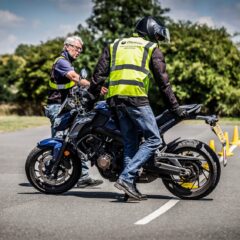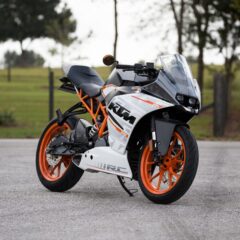
7 Top Motorcycle Accessories
With Christmas just around the corner, you might be wondering what to get your favourite motorcycle enthusiast or even a little something for yoursel...
 Phoenix Motorcycle Training LTD
Phoenix Motorcycle Training LTD
 Phoenix Motorcycle Training LTD
Phoenix Motorcycle Training LTD

Getting to work on time can be a stressful experience. Particularly if you’re relying on fickle train and bus drivers. Opting to bite the bullet and pay motorcycle training costs instead is one way to reduce your stress and increase the fun in your life.
Riding to work on a motorcycle means you’re not relying on union leaders to agree with corporate CEOs. (Will that ever happen??) Instead, you can rely on yourself and your motorcycle to make it to work on time. Plus there are all the other benefits of riding a motorbike to work.
Learning to ride a motorcycle isn’t as complicated as you might think. There are plenty of benefits to riding a motorcycle too. UK Motorcycle rules are just one reason riding is better than driving. Today, we’re going to break down motorcycle training costs versus the cost of commuting. We bet you’ll be surprised.
Learning to ride a motorcycle is faster than learning to drive a car. That’s because the training is more intensive. Within a weekend you can go from never having ridden a moped or motorcycle to getting your compulsory basic training certificate (CBT). That certificate is your first licence to ride.
CBT motorcycle courses cost around £160. Everything you need to learn how to ride is included in a Phoenix motorcycle training course. Everything except you, your boots and your lunch. A CBT course can be taken by anyone over the age of 15 and 9 months who has a provisional or full driving licence.
Your CBT certificate allows you to ride on all UK roads – aside from motorways – with a 125cc motorcycle or moped. If you want a bike with a little more oomph, you’ll need a higher-level licence. That’s where the Direct Access Scheme (DAS) for motorcycle lessons comes in.
DAS motorcycle classes let you train for the highest level of motorcycle licence you can get for your age. If you’re over the age of 24, you can go straight to the top-level licence after getting your CBT. That’s an ‘A’ licence with unrestricted power ratios for the bike you ride.
If you take your DAS motorcycle lessons with one of the Phoenix Motorcycle Training centres, everything you need is included in your motorcycle training cost. Training to go from CBT to a full motorcycle licence takes around 3 – 5 days. You’ll need to take two tests too; Module 1 and Module 2 cover different but equally important elements of riding a motorcycle.
The full licence DAS motorcycle training cost varies a little between training centres. In London, full-licence motorcycle training costs around £790, fast-track training for a full licence is also available for around £700.
Obviously, your commuting cost depends on a couple of variables. Where you live, where your place of work is and the times of day you need to travel are major factors. To compare motorcycle training costs with train travel, we’ve chosen a few different scenarios.
Below we look at commuting between Brighton and London, the cost of travel in the classic commuter belt of the Thames Valley, Reading to London City centre, and finally, commuting between zone 6 in London to zone 1 in the City Centre. All prices are for travel in usual work hours and have been based on The Trainline’s 2023 charges and average petrol prices this year.
An annual train ticket from Brighton to London Thameslink will set you back a cool £4,880.00. That includes a zone 1 – 6 underground travel card, but you’ll only be able to use Thameslink services. For a little more freedom of choice with trains and a London underground travel card, expect to pay £6,248.00 for a year. The journey takes approximately 2 hours – if the train isn’t delayed or cancelled.
There’s roughly 65 miles between Central London and Brighton. The average 125cc motorbike gets 94 miles to the gallon. A larger and faster motorcycle such as a Suzuki GSX R600 will get around 40 miles to the gallon.
Even with petrol prices averaging 165p per litre (or 724p per gallon) this year, a return trip from Brighton to London will cost around 995p on a 125cc and around 2338p for the larger 600cc sports bike. For a year of commuting, that’s £2985 and £7014 respectively (based on 300 days). The journey takes around 2 hours and doesn’t require any motorway travel.
An annual ticket from Reading to London Central without the tube will set you back £5,044 per year. With a zone 1 – 6 underground pass, you need to find another $940. The train journey takes around an hour and a half. That’s including changes, but not delays or cancellations.
The journey takes approximately 1.5 hours on a motorcycle – even in heavy traffic – and covers around 44 miles in total. Most of those miles are on the M4 motorway. If you ride with a CBT, you’ll need to take an alternate route that avoids the M4. This covers the same distance but takes around 2 hours, thanks to the slower roads.
A year of commuting on a 125cc motorbike or scooter between Reading and London will cost around £91.20 in fuel per year. On a larger bike, you’ll pay around £168 per year in fuel. Even when you factor in your motorcycle training cost, it’s far cheaper than taking the train.
The outer suburbs of London in Zone 6 – Twickenham, Uxbridge and Teddington – are an easyish commute from Central London. An annual tube pass covering zones 1 to 6 will set you back somewhere in the region of £1,908 to £2,160. Travel time is roughly 40 minutes.
There are 11 miles between Twickenham and Central London; 14 miles from Teddington. For this scenario, we’ll split the difference and call it 12.5 miles. Commuting that distance on a 125cc will cost around £21.10 each year and roughly £50 for a larger bike. Travel time is around 50 minutes, but you’re guaranteed a seat.
The time and money cost of commuting by motorcycle or moped is generally lower than the cost of travelling by train. It’s not just the cost of fuel. Motorcycle training costs, safety kit and even maintenance for your bike will tally up to be less per year than most annual train tickets.
The unreliability of train travel creates unnecessary stress. The cost of turning up late to work again, explaining that to your boss, and the endless evenings trying to get home can’t be calculated. Neither can the lost hours with your family, friends or loved ones.
Commuting with a motorcycle or moped is more reliable, cheaper and better for you than travelling by train. Why not book your motorcycle lessons today?

With Christmas just around the corner, you might be wondering what to get your favourite motorcycle enthusiast or even a little something for yoursel...

If you love motorcycle riding, you’ve probably daydreamed about riding a motorbike for a living. A professional racer or stunt rider is OK for some...

Getting a UK motorcycle licence can seem a complicated process. Particularly when compared to a driving licence for a car. Whether you choose the pro...
This website uses cookies to personalise content, ads, and analyse traffic, sharing data with partners who may combine it with other information. See our Privacy Policy for more information.